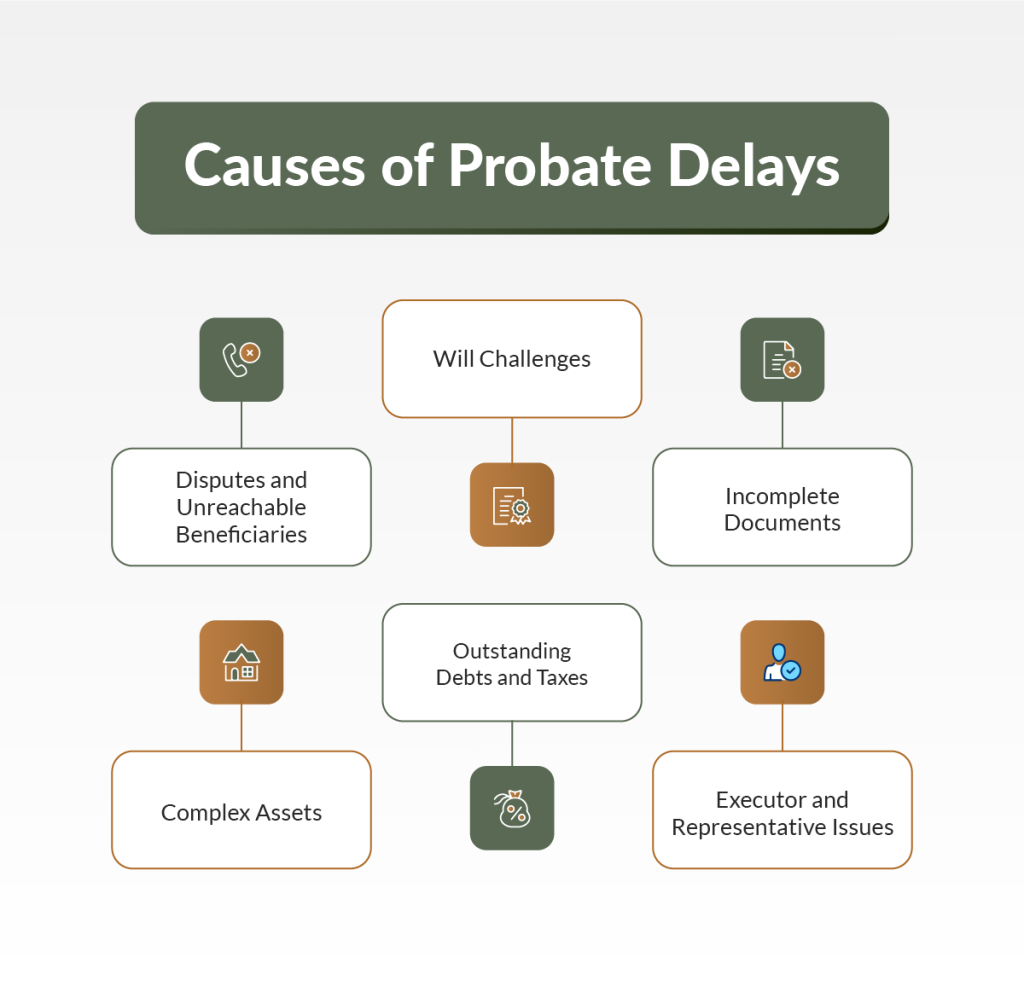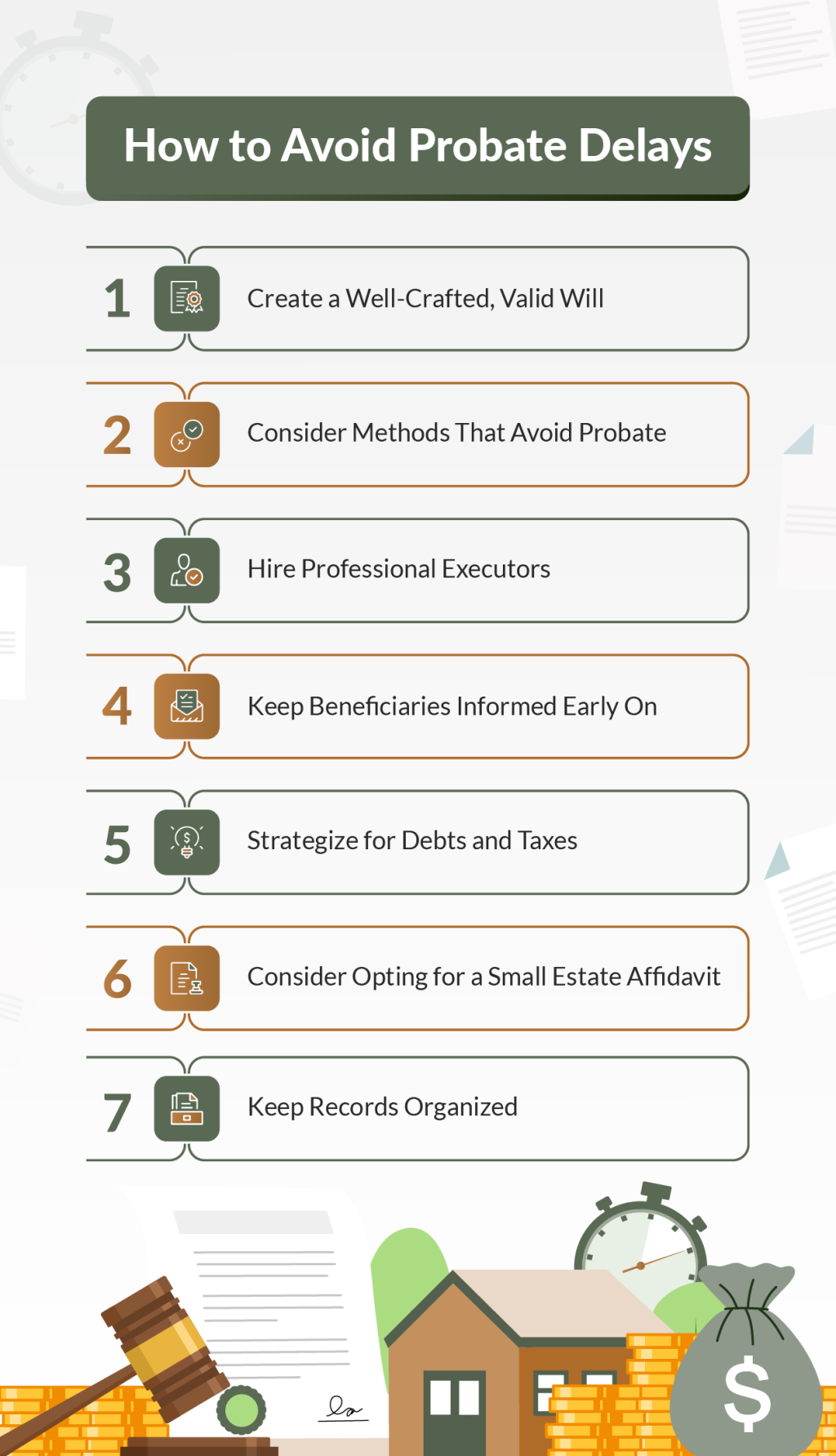
What are common reasons for probate delays?
What are common reasons for probate delays?
Probate is the legal process of distributing your loved one’s assets and paying any remaining debts. The person responsible — the executor or administrator — will open a probate case. It can start 30 to 90 days after a person’s passing. If your loved one didn’t have a will or didn’t appoint an executor, usually a family member, a judge may appoint a personal representative to bear the responsibility. Probate may or may not be required regardless of whether there is a will, depending on the estate’s size and type of assets.
Your loved one’s estate comprises the assets to be distributed. It can take six to 12 months to settle the estate by paying debts and distributing assets, but this period can be extended due to delays. While state-specific deadlines play a role, whether there is a will, the executor or personal representative, asset types, and debts impact the timeline. Proper planning can prevent some delays. If you’re an appointed executor managing expectations or a loved one waiting for an inheritance, Inheritance Funding breaks down what probate delays to watch out for and how to avoid them.
What Can Cause a Delay in Probate?
Delays are often due to will disputes, inaccurate documents, complicated assets, ongoing bills and taxes, and problems with executors. Here’s what happens behind the scenes.

1. Will Challenges
People who will receive assets, known as beneficiaries, or other relatives can contest the will. They may claim the will is invalid due to fraud or undue influence. It can take several months or years to prove a will’s validity, but the following can serve as proof:
- If your loved one has signed the will in front of two adult witnesses who are not beneficiaries.
- If the signature is dated and in writing, not a digital signature.
- If your loved one made recordings of declarations.
Specific validity requirements vary by state. If the will was lost or destroyed, the executor must prove it was duly executed — that is, signed according to the law. If the executor proves there was a valid will, challengers must prove it had been revoked.
A handwritten will, or a holographic will, can be valid and often doesn’t need witnesses. The executor must only prove it has your loved one’s handwriting. If a will is invalid, a previously valid will — if multiple versions were created — or the state’s intestacy laws will be followed. Intestacy laws determine what happens to a person’s assets without a will. A will can also be partially valid. The will can be invalidated if the executor does not file for probate within a specific time frame.
Assets not included in the will are called a remainder property. Unless the will has a residuary clause, remainder property can be passed on to heirs as if there were no will.
2. Disputes and Unreachable Beneficiaries
Unclear will clauses can lead to disputes. For instance, beneficiaries may dispute the rightful owner of a particular asset. When a person forgets to update their will to include additional family members, a legitimate heir can also be overlooked.
Even without disputes, locating beneficiaries sometimes takes time. Family members may have moved or lost contact. In some cases, the court may also require formal proof of relationships.
3. Incomplete Documents
Missing and inaccurate documents delay probate, so executors and representatives must be organized when managing the estate. Outdated account statements and deeds also affect the timeline. Requirements vary, but the following documents are often needed:
- Will
- Death certificate
- Asset records and appraisal valuations
- Federal and state income and gift tax returns
- Life insurance policies
- Prenuptial or postnuptial agreements
- Business agreement documents
- List of known debts and ongoing bills
- Beneficiaries’ contact information
The executor must have multiple copies of the death certificate to send to relevant parties, such as government agencies and financial institutions. Probate cannot start without the death certificate, will and key asset records. Sometimes, these records must be tracked across multiple jurisdictions. Documents in safe deposit boxes and digital accounts also need court approval for access.
4. Complex Assets
Complex assets can include real estate, businesses and collectibles. Executors may need to work with professional appraisers to determine the assets’ fair market value. Rare collectibles, like art and memorabilia, can be harder to value and sell. Incorrect documents, such as real estate title inaccuracies or boundary issues, also cause delays.
Additionally, assets across multiple states may require ancillary probates. Assets or properties must follow the state laws where they are located. The original probate may be put on hold until ancillary probates are finished.
5. Outstanding Debts and Taxes
The executor needs to settle your loved one’s remaining debts and taxes. If the cash isn’t sufficient, some assets may need to be liquidated or converted into cash to serve as payments. The executor must handle such payments before distributing the inheritance to avoid being personally liable for potential deficits.
States have time limits for when a creditor can make a claim, usually several months. Potential creditors include:
- Government tax collection agencies
- Medical providers
- Financial institutions
- Lawyers, accountants or other professionals
- Funeral and burial service providers
Ongoing expenses usually include mortgages, utility bills, business debts and property taxes. The executor must also pay for your loved one’s income tax, estate income tax and estate tax. Filing the final income tax return works similarly to a living person’s tax return. While an estate income tax return reports the estate’s income, the estate tax return reports the value of all the assets minus the debts or deductible expenses.
6. Executor and Representative Issues
The executor or personal representative’s process affects the probate timeline. If they cannot perform their duties, the court may appoint a replacement. Although replacing executors also delays the process, it can be a good idea if the executor:
- Does not communicate with the beneficiaries.
- Consistently misses deadlines.
- Failed to defend and follow through on the will.
The executor’s job requires time investment and attention. The right person should be organized, detail-oriented, and legally and financially knowledgeable. While the work can be hard to manage for a family member navigating grief, working with professionals can help.
How to Avoid Probate Delays
Many probate delays can be avoided through estate planning. Estate planning involves strategizing how a person’s assets can be managed or distributed upon their incapacitation or death. If you’re waiting for an inheritance due to insufficient cash, consider getting an inheritance advance. Otherwise, the following methods in avoiding delays are most applicable if the person writing the will is still with you.

1. Create a Well-Crafted, Valid Will
What constitutes a valid will differs in each state. Generally, a will is valid if there’s no doubt about the person’s mental capacity in writing the will. For instance, they must not have been influenced or coerced into writing certain clauses. The clauses should also be clear to avoid misinterpretations. Attorneys can help draft a will that can reduce the chances of disputes.
The person writing the will, known as the testator, must sign it in front of impartial, adult witnesses — witnesses who wouldn’t benefit from the will. The witnesses may also need to sign the will and attest that they saw each other sign it. Some states permit a self-proving affidavit, where witnesses swear the testator signed the will. While a will can often be typed or written, some states recognize an oral will.
2. Consider Methods That Avoid Probate
The fastest way to receive or distribute an inheritance is to avoid probate altogether. These methods or accounts can help.
- Revocable living trusts: This trust type lets a person fully control which assets become part of the trust. The trust becomes the owner of the assets — not the person, so these assets skip probate.
- Joint ownership: Joint ownership is common for real estate but can also apply to other assets like financial accounts and securities. Upon a person’s death, the title passes automatically to the surviving owner. However, joint ownership provides rights to co-owners, even before death.
- Pay-on-death (POD): PODs can be suitable for checking accounts, savings accounts, certificates of deposits or other similar financial accounts. Beneficiaries have no rights to the account until the original owner’s death. There can also be two or more beneficiaries. The money will be divided among them.
- Transfer-on-death (TOD): TODs let a person designate beneficiaries for real estate, securities and vehicles while bypassing probate. The owner specifies the asset percentage that beneficiaries will receive.
- Gifting: Owners can gift assets before their death. Because they will no longer own such assets, the assets won’t go through probate. However, if gifts exceed a certain amount, gift taxes may apply.
3. Hire Professional Executors
Professional executors already have experience administering estates. With the complex process and legal and financial aspects involved, they may be better suited for the job. Dispute resolution is also a skill that can be harder to practice when dealing with a passing loved one. Leaving the work to a grieving family member may do more harm than good.
Appointed executors can also decline the responsibility. For instance, an appointed family member may have a full-time job and cannot commit to the tasks. Professional executors typically receive commissions, even if they are family members, unless they waive such payments. The payment comes from the estate, which could be a flat fee or a percentage of the estate’s value.
4. Keep Beneficiaries Informed Early On
The executor must keep beneficiaries reasonably informed of the estate’s activities. If a beneficiary is not informed about the will, they may dispute it and revoke its admission into probate. The executor should also provide timely notice regarding the initial probate hearing. Otherwise, it signals their failure to perform their duties, which can lead to dispute delays and potential executor replacement.
Beneficiaries may be entitled to a copy of the will. This copy helps them ensure its validity and freedom from ambiguous language. Probate attorneys can help interpret the will.
5. Strategize for Debts and Taxes
Large debts are best paid off immediately to ensure the executor can allocate assets appropriately after a person’s passing. Unpaid debts eat into beneficiaries’ inheritance, while paid-off debts limit creditor claims.
Although some taxes, like estate taxes, can be hard to avoid for larger assets, tax strategies can limit such obligations. For instance, the annual gift tax exclusion lets people gift assets up to a certain amount without incurring gift taxes, which lowers the taxable estate.
6. Consider Opting for a Small Estate Affidavit
If assets fit the definition of a small estate, the executor may be able to bypass probate. For instance, in California, you can use a small estate affidavit if the estate is worth up to $184,500. In New York, the assets need to be less than $50,000.
However, this affidavit may not be used for real estate, such as a house or land. If you’re waiting for the inheritance, you cannot use this affidavit once a probate case has been opened. You may need to request permission from the personal representative otherwise. States also typically require a specific number of days after a person’s passing before you can use the affidavit.
7. Keep Records Organized
If you’re an executor, you should organize all essential documents, such as the will, death certificates, account statements, deeds and tax returns, right away. Having these organized can lead to faster filings, inventories and court approvals. Clear and organized records will also help you make your case in a dispute. Beneficiaries can trust you better with the transparency.
Additionally, mismanagement can make you personally liable for any deficits if the money runs out before all debts and taxes are paid. You may also face legal consequences due to negligence and poor administration.
Prepare for Probate
Probate usually lasts for several months to years because of the complex asset distribution process. While some delays can be mitigated through estate planning, some causes are difficult to avoid. Delays may be due to:
- Will disputes
- Incomplete, inaccurate documents
- Large and complicated assets
- Outstanding debts and taxes
- Lack of beneficiary communication
- Issues with executors or personal representatives
If you or your loved one is still writing a will, working with an attorney can help ensure clarity and reduce disputes. Alternative asset transfer methods, like trusts and gifts, are also worth considering. For a smoother process, the executor should be organized and equipped with the right skills. Working with the right professionals can also help.
This story was produced by Inheritance Funding and reviewed and distributed by Stacker.



